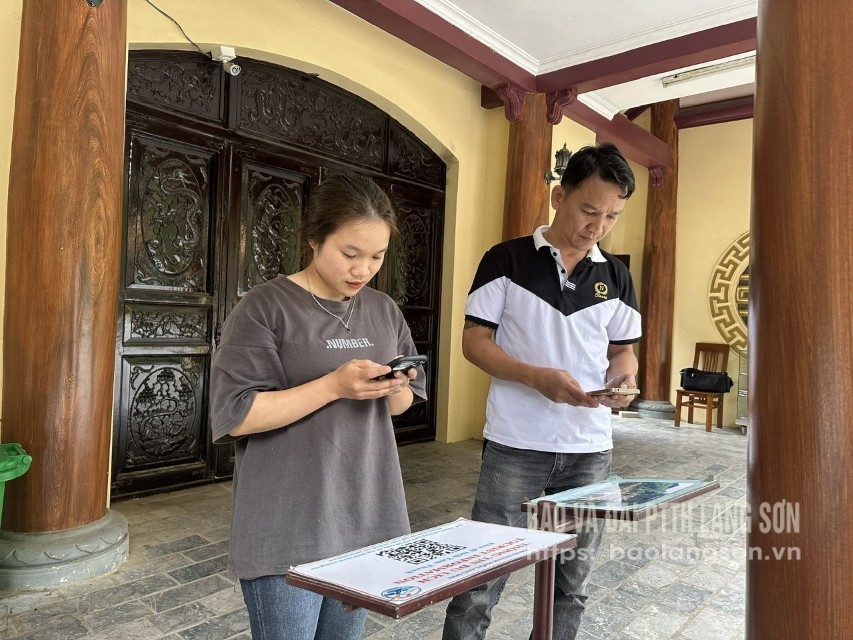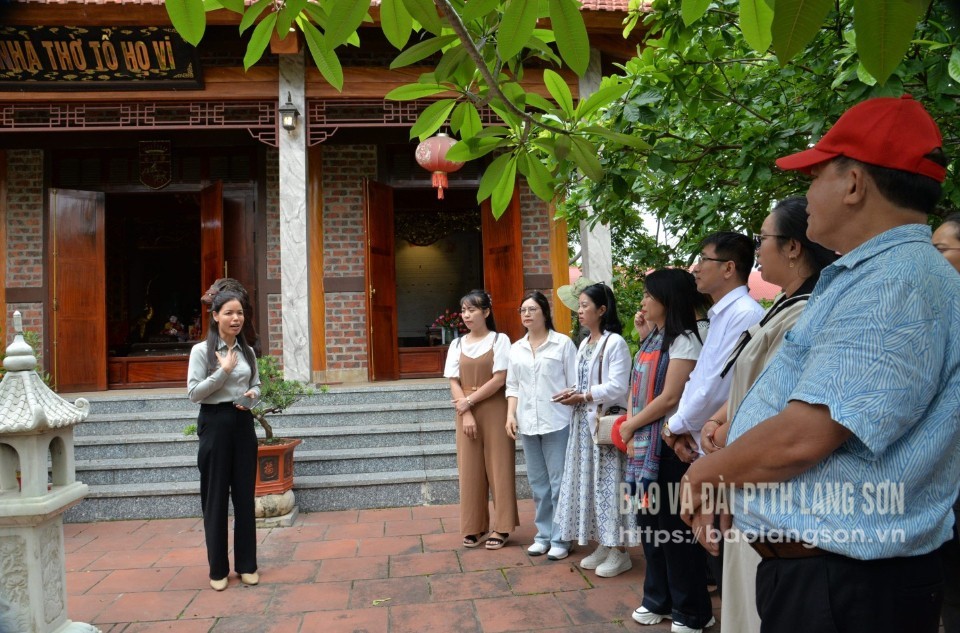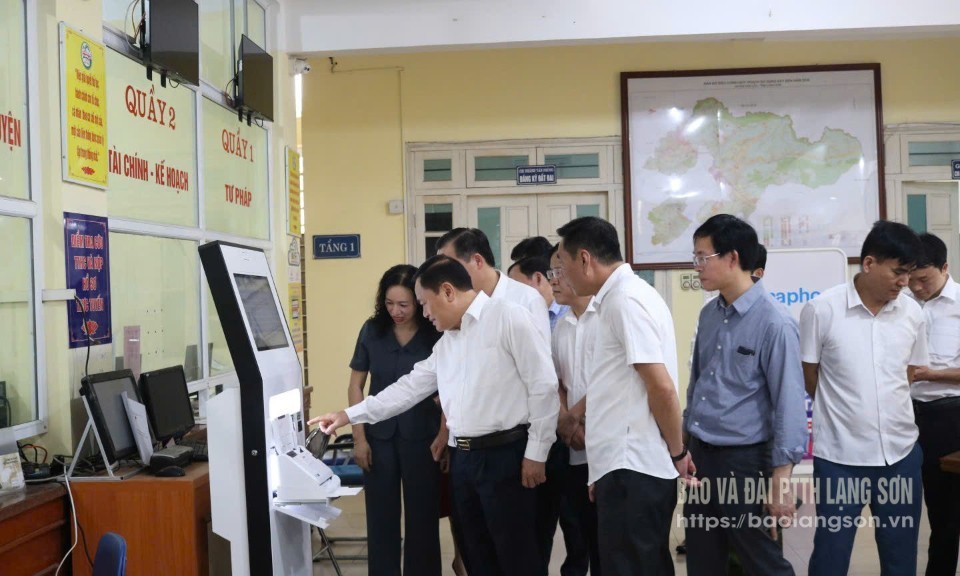Digital transformation revolutionizes tourism in Lang Son
Amidst the rapid advancement of the Fourth Industrial Revolution, digital transformation has become an inevitable trend across all sectors, including tourism. In Lang Son province, the Department of Culture, Sports and Tourism is synchronously implementing numerous digital transformation solutions, viewing it as a crucial driving force to enhance management efficiency, increase competitiveness, and improve visitor experiences.

First-time visitor Nguyen Van Hoi from Kien An Ward, Hai Phong city, was pleasantly surprised by the digital technology adopted at Tam Thanh Pagoda in Lang Son city. At the pagoda's entrance, QR codes allow tourists to check in and access information about Tam Thanh Pagoda and Lang Son tourism. Hoi stated that by scanning the QR code with his smartphone, he could view a panoramic aerial view of the pagoda and immersive 3D virtual reality images of its interior spaces. Additionally, the application provides narration about the pagoda's formation and the significance of its various areas. "This is a very interesting experience that not all tourist destinations offer," Hoi said.
Beyond impressive on-site technology, digital applications also assist travelers in planning their trips. Nguyen Xuan Tung from Hiep Hoa, Bac Giang, shared: "As an explorer, before coming to Lang Son, I visited various websites to research the province's tourism and downloaded the 'Lang Son Tourism' app. Here, I found a lot of useful information. So, even though I only had two days in Lang Son, I was able to explore many places like Tam Thanh Pagoda, Nhi Thanh Cave, Mac Dynasty Citadel, Quynh Son Community Cultural Village (Bac Son), and especially discover Lang Son's famous local delicacies highly recommended by residents."
The conveniences experienced by visitors like Tung and Hoi are the result of the proactive and decisive efforts by the Department of Culture, Sports and Tourism in applying technology and progressively building a smart tourism ecosystem.

Luu Ba Mac, Deputy Director of the Department of Culture, Sports and Tourism, stated: "We consider digital transformation as the key to enhancing management efficiency, improving service quality, and gradually developing Lang Son tourism towards a smart and sustainable direction." In recent times, the department has advised the Provincial People's Committee to issue various plans, notably the plan for developing Lang Son province's smart tourism system for the 2021–2025 period.
The plan's focus is on building a smart tourism portal, developing mobile applications, integrating digital maps, digitizing tourism data, and implementing 3D virtual reality tours. To date, Lang Son province's tourism portal is operational, integrating numerous features such as digital maps, smart search, online service booking, and experience sharing and reviews. From 2023 to the present, the portal has recorded over 6.1 million visits, demonstrating its appeal and significant interest from tourists in Lang Son's tourism.
The virtual reality tour system has been deployed at 31 typical tourist attractions across the province, allowing visitors to explore Lang Son remotely, even before physically visiting. Furthermore, the "Lang Son Tourism" smartphone application is widely used by locals and tourists to look up information and plan itineraries. The province's tourism database system is uniformly digitized, continuously updating information on destinations, tour programs, accommodations, restaurants, entertainment areas, and more. This not only efficiently supports management but also facilitates quick and accurate access to information for tourists and businesses. Additionally, social media platforms like Facebook, YouTube, and TikTok are utilized by the Department to promote Lang Son's tourism image, effectively attracting a younger, more dynamic, and tech-savvy customer base.
Beyond technological infrastructure, the Department of Culture, Sports and Tourism regularly provides digital skills training for its officials and public employees. Enhancing digital capabilities helps the workforce better adapt to a modern working environment, proficiently using digital platforms in management, promotion, visitor services, and business support. This fosters a flexible and professional administrative apparatus, ready to lead the digital transformation process across the entire sector.
Vu Duy Hung, Head of the Nhi Thanh – Tam Thanh – Mac Dynasty Citadel Relic Management Team at the Lang Son City Culture – Sports Center, stated: "The implementation of digital technology at historical sites has been enthusiastically received by tourists. This not only provides them with meaningful experiences and a deeper understanding of the historical value of the sites but also contributes to promoting Lang Son tourism. We also use social media to promote our events, thereby attracting an increasing number of visitors."
The application of digital technology and artificial intelligence (AI) has yielded positive results, making it easier for tourists to find information and create convenient travel itineraries. Digital platforms have also become effective bridges between tourists, businesses, and management agencies, facilitating real-time feedback and timely service improvements. Promotional activities have also become more vivid, diverse, and accessible to domestic and international markets.
In 2024, Lang Son welcomed over 4.2 million tourists (a 7.6% increase compared to 2023), achieving 103.8% of its plan. Tourism revenue was estimated at 4.35 trillion VND (a 38.6% increase), contributing approximately 5.4% to the province's total GRDP. From the beginning of 2025 to date, the number of tourists visiting the province continues to increase significantly.
With the evident benefits of digital transformation, in the coming time, the Department of Culture, Sports and Tourism will continue to collaborate closely with relevant agencies, businesses, and technology partners to refine the smart tourism ecosystem. The goal is to make Lang Son a modern, friendly, and easily accessible destination, becoming one of the pioneering localities in digital transformation within the tourism sector of the Northern Midlands and Mountainous region.
 Loading
Loading  Tiếng Việt
Tiếng Việt English
English 中文
中文


